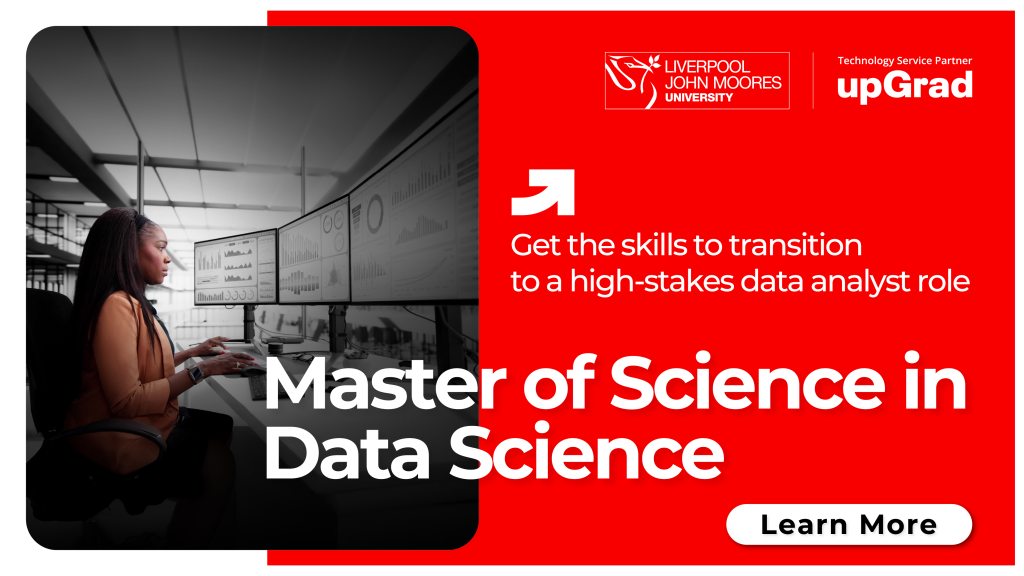Every Canadian industry, from healthcare and finance to retail, is hiring data science professionals to handle, visualize, and analyze data using powerful tools. To put it into context, Canadians invest approximately $40 billion in data science, databases, and data annually.
So, if you want to build a lucrative career in the field, here is a guide to some of the best data science tools that you should not miss.
Source: Business Council of Canada
Take your skills to the next level — Explore Data Science Online Course
Data Science Tools That Canadian Professionals Can’t Afford to Miss
From data science tools for beginners to more advanced data scientist tools, there are several must-know options in the list. Let us take a closer look at them below.
| Industry | Beginner Positions | Advanced Positions |
| Finance | Data Analyst and Junior Data Scientist | Senior Data Scientist, Fraud Detection Specialist, and Risk Analyst |
| Technology | Data Analyst and Machine Learning Engineer (entry-level) | Machine Learning Engineer, AI Research Scientist, and Data Science Manager |
| Retail | Data Analyst and Junior Data Analyst | Data Scientist for Retail Analytics, demand forecasting specialist |
| Healthcare | Healthcare Data Analyst and Junior Data Scientist (Health) | Senior Data Scientist (Healthcare) and Biostatistician |
| Telecommunications | Data Analyst and Junior Data Scientist (Telecom) | Data Scientist (Network Analysis) and Machine Learning Engineer (Telecom) |
| Marketing and Advertising | Data Analyst and Junior Data Scientist (Marketing) | Data scientist (Marketing Analytics) and Predictive Modeling Specialist |
| Government/Public Sector | Data Analyst and Junior Data Scientist (Government) | Data Scientist (Public Policy), Data Science Consultant (Government) |
Here are key data science tools and technologies that professionals in Canada should be familiar with.
Python and R for Data Analysis
Python is the most widely used programming language for machine learning and data science. It is known for its simple syntax, built-in data structures, and binding capabilities. You can use it for data visualization, analysis, and object-oriented programming.
R is another programming language that helps with statistical computing, data manipulation, data visualization, analysis, and graphics applications. R helps in retrieving, presenting, and analyzing data, making it a popular choice for data science professionals.
Also Read: Python vs R for Data Science in Canada
Data Visualization with Tableau and Power BI
If there is a list of the top 10 data science tools, Power BI will be an indispensable inclusion. It is a user-friendly software tool that helps distribute, analyze, and visualize data on a business intelligence platform. You can use it to unearth patterns and insights while integrating disparate datasets, and also convert raw data into an intelligible model. Power BI can also create complex data models showing relationships between various elements.
Tableau is another powerful data science tool, with its interface enabling simultaneous sorting, comparisons, and analysis of data from various sources. You will also find several data visualization and organization tools here, along with easy connectivity to multiple sources, i.e., cloud services, spreadsheets, databases, and more. It is also easy to publish interactive dashboards to Tableau Online or Tableau Server.
Database Tools: SQL and Excel
SQL (Structured Query Language) is a programming language to manipulate and manage relational databases. You can effortlessly organize data into tables and manage databases seamlessly with support for writing queries. There is easy integration with other computer languages and apps as well.
Excel is the lifeblood of data science. You can use it to organize, format, and calculate data in spreadsheets. It also helps convey information with rows and columns, while leveraging formulas to summarize, analyze, and visualize data. It will help you automate various repetitive functions and analyses while generating interactive visualizations with the help of pivot tables.
Big Data and Machine Learning Tools
There are several essential big data and machine learning tools that every professional should master. They include:
- Big Data- Hadoop, Apache Spark, Kafka, Apache Cassandra, Talend, Cloudera, SAP HANA, and Teradata Vantage.
- Machine Learning- PyTorch, TensorFlow, Scikit-learn, Amazon SageMaker, Keras, Weka, RapidMiner, Azure Machine Learning, and BigML.
Also Read: How Canadian Business Leaders Can Use Machine Learning
Cloud & Collaboration Tools: Jupyter and Google Colab
Every data science tools list will also contain some helpful tools for collaboration and cloud-based project work. Jupyter Notebook enables more interactive collaborations among data engineers, scientists, researchers, and mathematicians. It can help create, edit, and share code, images, explanatory text, and other data.
Another helpful collaboration tool is Google Colab, also known as Colaboratory. This cloud-based and free environment enables data scientists and machine learning engineers to write and implement Python code directly in their web browsers. You can also get access to resources like TPUS and GPUs.
Also Read: Is an Online Master’s in Data Science in Canada Worth It?
What Makes These Tools Essential for Canadian Job Roles
These data science tools are crucial for Canadian job roles across sectors. Let’s take a closer look at some of the job positions that each tool category can help you secure.
- Python and R: Some of the positions include data scientist, data analyst, business intelligence analyst, research associate, stack developer (with Python specialization), Ops engineer, and machine learning engineer.
- SQL and Excel: You can utilize your knowledge of these tools to secure job positions such as data analyst, data scientist, business analyst, database administrator, financial analyst, business intelligence analyst, and quality control engineer.
- Big Data and Machine Learning Tools: Some of the job positions that you can apply for in this category include ML developer, big data developer, data engineer, data scientist, and more.
- Tableau and Power BI: There are several job roles that you can get with knowledge of these tools. They include a data analyst, a Tableau consultant, a Power BI developer, a BI analyst, a Tableau analyst, a financial analyst, a visualization specialist, and a business systems analyst.
Also Read: Exploring Data Science Jobs in Canada: Opportunities, Salaries, and Skills
upGrad Programs That Equip You With Industry-Ready Data Science Tools
upGrad helps professionals in Canada up-skill and broaden their knowledge of the tools and technologies listed above. You will discover several cutting-edge programs that come with real-world projects, industry-relevant curricula, coverage of the latest tools, expert instruction, and flexible modes of delivery for maximum convenience.
At the same time, upGrad also ensures dedicated mentorship, peer networking, career support, and personalized guidance that help you equip yourself with the skill sets you need to build a lucrative career in Canada. You can consider these courses from upGrad:
- Master of Science in Data Science from Liverpool John Moores University
- Executive Diploma in Data Science and AI with IIIT-B
- Executive Post Graduate Certificate Programme in Data Science & AI by IIITB
🎓 Explore Our Top-Rated Courses in Canada
Take the next step in your career with industry-relevant online courses designed for working professionals in Canada.
FAQs On Data Science Tools Every Canadian Professional Should Learn
Q: What are the most popular data science tools in Canada right now?
Ans: Several data science tools are immensely popular in Canada at present. Some of them include Python and R, Power BI, Tableau, SQL, Excel, Apache Spark, Hadoop, Kafka, Apache Cassandra, and many others.
Q: Do I need to learn all the tools to become a data scientist?
Ans: It depends on the career sector you’re interested in. For example, if you’re more into visualization and analysis, then Power BI and Tableau may be more helpful. If, alternatively, you are into programming, then Python and R are must-learn tools.
Q: Can I learn these tools without a technical background?
Ans: A technical background in coding or programming is beneficial for aspiring candidates. However, you can also learn these tools without a technical background. Several candidates from diverse educational backgrounds can remember them and transition to a career in the field.
Q: Are data science tools different across industries?
Ans: Many data science tools are the same across multiple industries. However, there are sometimes different tools that assume prominence in particular sectors. For example, Power BI and Tableau may be the predominant data science tools in the banking and financial sector.
Q: How long does it take to learn tools like Python or Tableau?
Ans: You may need a few weeks to a year to learn Python or Tableau, depending on your technical knowledge, background, aptitude, and willingness to learn. Basic skills may require 3-6 weeks, while advanced knowledge will need 4-12 months on average.









